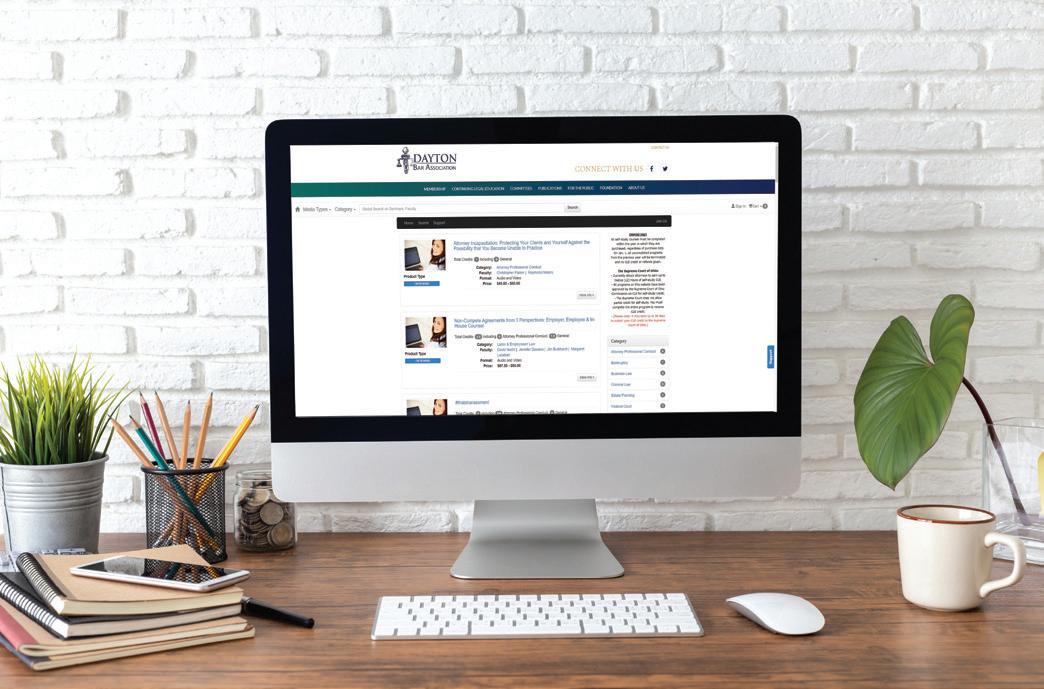
27 minute read
2020 JUDICIAL CANDIDACY SURVEY
2020 Dayton Bar Association Judicial Survey
When judges are on the ballot, be informed. We think you deserve impartial, nonpartisan information about your judicial candidates.This section has been created as a resource to help you make an informed decision when it is time to elect judges for Montgomery County Courts.
Advertisement
The DBA does not endorse any judicial candidate; our role is to provide impartial, non-partisan information about the judicial candidates in any given election year. All results from the Judicial Candidate Survey are available online for public consumption.
This year, there are three contestedjudicial races and fournon-contestedjudicial races. All candidates from these races were given the opportunity to respond to this survey within a character limit. Allcontested judicial race candidates responded. 3 of the 4 non-contestedjudicial candidates responded. Below is the list of questions that were asked of all candidates.
Q1: Please list your name, business address, contact information
Below are the list of candidates for the upcoming elections/races:
Judge of the Court of Appeals 2 nd District • • Christopher B. Epley Marshall G. Lachman
Judge of the Court of Common Pleas • K. George Kordalis • Susan D. Solle
Judge of the Court of Common Pleas Probate Division • David D. Brannon • Arvin S. Miller More info on these elections can be found on the Montgomery County Board of Elections website: www.montgomery.boe.ohio.gov
Judge of the Court of Common Pleas • The Honorable Dennis J. Adkins • The Honorable Steven K. Dankof - declined to respond • The Honorable Mary Katherine Huffman • The Honorable Richard S. Skelton
Chris B. Epley Esq.
Christopher B. Epley Co LPA 10 W 2 nd ., Ste 2400 Dayton, OH 45402 chris@chrisepleylaw.com
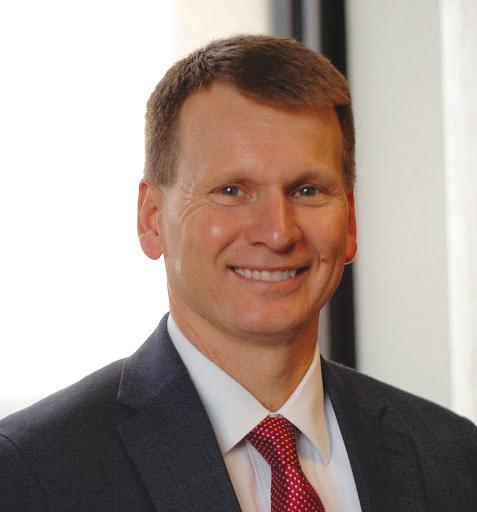
937-228-7511
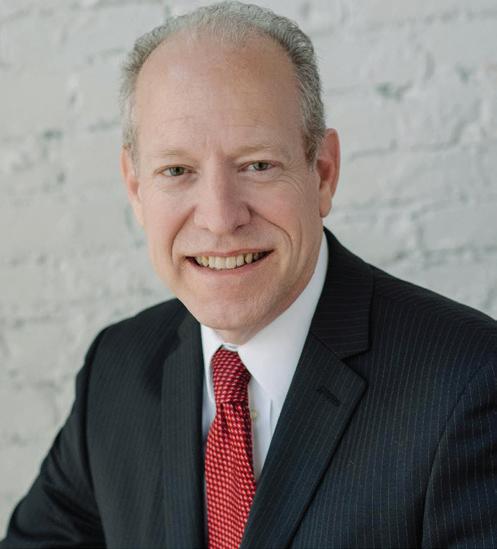
Marshall G. Lachman Esq. 75 N. Pioneer Blvd. Springboro, OH 45066 lachman@mglachman.com 937- 369-6288
Please detail your legal biography using the following format: Undergraduate Education; Legal Education; Graduate Education and Legal/Courtroom Experience: • Denison University BA English Literature / Spanish (double major); • University of Dayton School of Law • Courtroom experience in civil and criminal matters, domestic relations, juvenile and probate courts. I have administrative law experience from a city council member point of view. My practice also includes transactional work.
Please explain why you believe you are qualified for the judicial position for which you are seeking election. I am qualified for the Court of Appeals for the following three reasons: 1.) I teach Appellate Practice and Procedure at UD; 2.) I am the Chief Appellate Attorney in the Vandalia Prosecutors Office; and 3.) I have judicial experience as a Dayton Municipal Court Magistrate. In addition, my general law practice covers many areas of the law which come before the Court of Appeals.
What experiences in your life or personal attributes make you believe that your courtroom would be a place where everyone receives justice, regardless of race, socio-economic status, gender, etc.? I am an active member of the community serving in different leadership roles over the years. I have served as a school board member, city council member, Rotarian, guardian ad litem, and life fellow in the Dayton and
Ohio Bar Associations. I have been a member of a team (Denison Soccer) and a coach of various teams (baseball, soccer, basketball). All of those experiences have given me the opportunity to listen and critically think about the effect words and decisions have on people. I believe those attributes make the courtroom a place where all receive justice.
What will be the most significant challenge facing courts over the next ten years and what plans do you have to address that challenge? Technology is evolving in the world and we see its significance on our daily lives and in the Courts. Technology has made legal research and case management better and efficient. But, it has a learning curve and requires continual updates as changes occur. Most recently, I have used technology as a video conferencing format in city council meetings, teaching at UD, and in Court. Over the next ten years, capturing the benefits of technology will be important to ensure litigants have access to justice and that Courts remain efficient.
Please detail your legal biography using the following format: Undergraduate Education; Legal Education; Graduate Education and Legal/Courtroom Experience: • University of Illinois at Urbana-Champaign, Accountancy, 1985; • The Ohio State University College of Law, 1988; • Initially, my practice in Illinois focused on civil litigation, domestic relations and probate matters. Over the past seventeen years in Ohio, my practice has focused primarily on criminal defense matters, both at the appellate level, where I have handled more than one hundred appeals in the Second District Court of Appeals and many cases before the Ohio Supreme Court, and more than a thousand cases at the trial court level, where I have handle everything from misdemeanor offenses to the most serious of felony offenses, including capital murder.
Please explain why you believe you are qualified for the judicial position for which you are seeking election. Having spent thousands of hours in courtrooms over the past thirty years, handling complex cases in both civil and criminal matters, at both the trial court and appellate court levels, I have the knowledge and experience necessary to be a Judge of the Second District Court of Appeals.
In addition, I have earned the respect of the attorneys I work with and the judges I appear before. I have been honored twice by the judges of the
Montgomery County Common Pleas Court for my work in that court, most recently in 2016, having been awarded the court’s Gideon Award for
Lifetime Achievement in the representation of indigent defendants in that court. I was also honored in 2011 by the Montgomery County Juvenile
Court for my work in that court.
What experiences in your life or personal attributes make you believe that your courtroom would be a place where everyone receives justice, regardless of race, socio-economic status, gender, etc.? For me, it starts with a respect for the law and the American system of justice. Our system requires a commitment from judges and attorneys to ensure that justice is served, regardless of race, socio-economic status, or gender. It also requires an understanding of the litigants who come before the court on a daily basis. My understanding comes from thirty years of courtroom experience in the practice of law. As a litigator, I have never shied away from taking the toughest of cases, often-times being asked by the court to do so. The understanding that comes from such experience will make me a better judge and ensure that all litigants that come before me will be treated fairly, regardless of race, socio-economic status, or gender.
What will be the most significant challenge facing courts over the next ten years and what plans do you have to address that challenge? I believe the most significant challenge facing courts over the next ten years is making sure that the hyper-partisan nature of today’s politics does not infect the judiciary. It is imperative that judges remain “above the fray” or risk being drawn into the same partisan battles that others regularly find themselves in. If that happens, there is a significant risk that people will lose faith in the judiciary, which itself threatens our rule of law. To address this challenge, I will always strive to issue decisions that are based on the actual law, not on perceptions of what the law should be. In this way, litigants who appear before me will know that I considered the issues presented fairly and impartially, without bias or prejudice.

K. George Kordalis Esq. Kordalis Law Office, LLC 130 W. Second St., Ste 1818 Dayton, Ohio 45402 KKordalis@Kordalis-Law.com 937-224-1212
Please detail your legal biography using the following format: Undergraduate Education; Legal Education; Graduate Education and Legal/Courtroom Experience:
I attended The Ohio State University for undergrad and The University of Dayton School of Law. While in law school I clerked for Judge Gorman. Upon graduating law school, I interned at the Montgomery County Public Defender’s Office. I have been in private practice since 2012. My practice focuses on criminal defense, domestic relations, and personal injury cases. I have extensive courtroom experience. I have practiced in over thirty counties in the State of Ohio, the Southern District of Ohio, and the Southern District of Illinois. I have litigated over one thousand cases in private practice. This includes serious felony offense such as murder, rape, involuntary manslaughter, and federal drug offenses. In addition to my private practice, I am also a special prosecutor for Miamisburg and Xenia.
Please explain why you believe you are qualified for the judicial position for which you are seeking election. I am qualified to be a Common Pleas Judge because I have the experience needed to handle the cases before me and the perspective to bring positive changes to the
Bench. The experience of running my own law practice will assist me in running an efficient docket. I understand the need for thorough and expeditious rulings on pretrial
Motions. Keeping a docket moving is beneficial to the Court, attorneys, clients, and the community. I practice in Montgomery County Common Pleas Court almost daily.
I’ve seen first-hand what works and what doesn’t. As I’ve stated above, I’ve handled some of the most serious cases that come through this court.
What experiences in your life or personal attributes make you believe that your courtroom would be a place where everyone receives justice, regardless of race, socio-economic status, gender, etc.? As the son of immigrant parents, I saw how hard my parents worked to overcome adversity and make a comfortable life for our family. I saw my parents struggle to be treated fairly because of their accents. Even though my parents were often treated unfairly, they taught me and my siblings to be respectful to everyone even in the face of disrespect. I carried that into my private practice. I have always attempted to treat clients, attorneys, and members of the judiciary fairly and with respect. In private practice and in my time as an intern at the public defender’s office, and serving as a
Court appointed attorney, I have represented many indigent clients. This experience opened my eyes to a world of problems that the Court should be considering when determining proper sentences. For example, mental health issues are prevalent in many cases. Many of my client’s suffered from undiagnosed mental health issues which resulted in them being charged with a crime. Seeing it firsthand, allows me to have a different perspective on the issue of criminal justice and mental health. As a defense attorney I have seen how criminal charges often a profound effect on a person’s life and the need for everyone to be treated fairly. Unfortunately, this does not always happen.
What will be the most significant challenge facing courts over the next ten years and what plans do you have to address that challenge? There is a strong social movement surrounding Criminal Justice reform which will likely be a significant force in our Court over the next ten years. There is a delicate balance between justice and mercy which should be handled with the utmost care and respect. Although it is unclear what will happen on a national lever, as a part of that reform I will work to incorporate a system to track sentencing to help achieve more transparency and fairness. The Common Pleas Court has eleven judges that impose criminal sentences almost daily. I believe that the Court needs to have a database that keeps track of all sentences based on offense level and other identifying information about the defendant (Age, Prior Criminal History, Mental Health Considerations).
This database should be made public to everyone. This would better help prosecutors, defense attorneys, and judges in determining a fair sentence and ensuring equality in our local criminal justice system. This database would only be advisory and not binding on the judges and would just serve as an additional tool when determining a fair sentence.

Susan D. Solle Esq. Dinsmore & Shohl LLP 1 S. Main St., Ste 1300 Dayton, OH 45402 susan.solle@dinsmore.com 937-313-4835
Please detail your legal biography using the following format: Undergraduate Education; Legal Education; Graduate Education and Legal/Courtroom Experience:
BA, Magna Cum Laude, Oglethorpe University, Atlanta GA, 1994; JD, Cum Laude, University of Dayton School of Law, Law Review and Moot Court, 1999; Law Clerk for Judge Sunderland in the Montgomery County Common Pleas Court; Staff Attorney for Judge Brogan in the Second District Court of Appeals, 1999-2002; Surdyk, Dowd, & Turner, 2002-2004; Dinsmore & Shohl (Chernesky, Heyman & Kress merged in 2008) 2004-present, civil trial and appellate attorney; Served as Acting Judge in Montgomery County Municipal Court handling misdemeanor and traffic docket, felony arraignments, and civil trials; Adjunct Professor at UDSL teaching Appellate Advocacy since 2004; Past President Dayton Bar Association; President Dayton Bar Foundation.
Please explain why you believe you are qualified for the judicial position for which you are seeking election. Over the past 18 years, I have handled civil cases all over the state in virtually every area of law that I will decide as a common pleas judge, including comprehensive business litigation, employment, insurance, personal injury, landlord/tenant, foreclosure, and more. I have written over 300 decisions on various criminal and civil issues as a law clerk in the common pleas court and staff attorney in the court of appeals, and handled numerous criminal dockets, felony arraignments, and civil trials as an
Acting Judge in Municipal Court. Equally important, I have the support of many attorneys in the bar who have been my adversaries in court, as well as judges, because they know I have the right temperament, compassion, and sense of fairness.
What experiences in your life or personal attributes make you believe that your courtroom would be a place where everyone receives justice, regardless of race, socio-economic status, gender, etc.? My passion for equal access to justice led me to join the Board of Trustees of Legal Aid of Western Ohio and Advocates for Basic Legal Equality, where I served for nine years, three as the president of both boards. I have also represented low income clients through the VLP for years. Since 2008,
I have served as a lawyer for Ohio Promote the Vote, ensuring every registered voter has unimpeded access to the polls. I will continue to participate in implicit bias training to do everything possible to recognize and avoid bias in my courtroom. Having grown up in this community,
I am committed to protecting the rights of every person who walks into the courthouse and making sure they are treated with respect and fairness.
What will be the most significant challenge facing courts over the next ten years and what plans do you have to address that challenge? I would say a significant challenge facing courts is understanding and improving racial fairness in sentencing across the state. Fortunately, the
Ohio Supreme Court is developing a system to gather sentencing data on various crimes to measure and better understand the racial disparity in sentencing across the state, and to implement change. Being cognizant of this disparity and taking steps to ensure race plays zero role in sentencing every day in my courtroom will help minimize this inequity. In the meantime, the use of programs like intervention in lieu of conviction, diversion, and the specialty treatment courts available in Montgomery County are excellent tools to circumvent sentencing concerns in many cases.
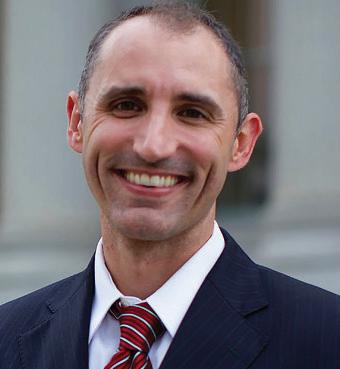
David D. Brannon Esq. Brannon & Associates 130 West Second St., Ste 900 Dayton, OH 45402 davidbrannon@branlaw.com 937-802-4900
Please detail your legal biography using the following format: Undergraduate Education; Legal Education; Graduate Education and Legal/Courtroom Experience:
Miami University, B.A. in Political Science and Public Admin. University of Dayton School of Law, J.D. Law Review. Top 15% Licensed by Ohio Bar (2005), U.S. District Court for Southern Dist. Ohio (2005) OSBA Certified Specialist in Probate Law (2015) I have handled hundreds of probate matters, including: estate administrations, guardianships of adults and minors, mental health issues, land sales, declaratory judgments, trust administrations, real estate transfers, concealment actions, heirship, instrument construction, will contests, creditor claims and other types of probate litigation. I also have extensive experience in general civil and criminal matters including: fiduciary, insurance, contracts, real property, and appeals.
Please explain why you believe you are qualified for the judicial position for which you are seeking election. I understand the substance and I also love it. Besides being an OSBA certified specialist, I remain active in the legal community and that will not change.
I routinely practice in other probate courts and see firsthand what works and what doesn’t. Electronic filing, videoconferencing and delays in decisions are consistent problems that should be improved. Fresh ideas and bold ideas are needed, and I am open to feedback. I have also served as trustee of various types of trusts, executor and administrator of numerous estates, guardian of the estate and person of adults and minors, power of attorney and in other fiduciary capacities. Competence, real world experience and an open mind are vital qualifications.
What experiences in your life or personal attributes make you believe that your courtroom would be a place where everyone receives justice, regardless of race, socio-economic status, gender, etc.? An attorney friend of mine recently said: We need great judges who are not only experts in the law, but are also human beings who can relate to and understand a vast array of people, problems, and life situations.
David Brannon is this kind of servant leader. After blushing, I thought first,
I am a listener. This is perhaps the most overlooked aspect of the judiciary.
Second, I believe in access to courts, regardless of status. A review of my cases demonstrates that I make an effort to take all meritorious cases, regardless of demographic. Third, no matter a person’s race, economic status or gender,
I believe people want a judge or lawyer that is dedicated to hard work, competent in the law and cares about people.
What will be the most significant challenge facing courts over the next ten years and what plans do you have to address that challenge? Access to courts. This includes an open-door policy with all agencies, to determine what resources are needed and whether the probate court can provide those resources or help facilitate. For example, I am endorsed by the
Federal Order of Police unions 117, 92 and 44. In discussions with command staff and officers, I understand police departments need an open line of communication, particularly around issues involving the mentally ill patients that are jailed. I would ensure law enforcement and other agencies have 24-7 on-call access to myself or court personnel to assist. I would also propose a law clinic be placed under the roof of the court. These programs have been successful in areas such as filing tax returns and evictions.
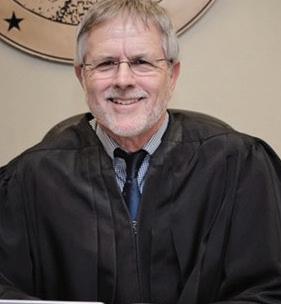
Magistrate Arvin S. Miller III Montgomery County Probate Court 41 N. Perry St., 2nd Fl Dayton, OH 45422-2155 asmiii50@gmail.com 937-672-4907
Please detail your legal biography using the following format: Undergraduate Education; Legal Education; Graduate Education and Legal/Courtroom Experience:
• B A Miami University, J D University of Dayton • Mediation Training, NWU School of Continuing Studies;
ABA Advanced Mediation; Ohio Supreme Court Elder Mediation • Probate Magistrate (April 2008 – present) /Court Mediator • Visiting Assistant Prof. Dayton School of Law • Assistant County Public Defender • Assistant County Prosecuting Attorney • ABA, 1991 Pro Bono Publico Award (recognized for creating and developing the GDVLP) • UDSL “Distinguished Alumnus Award” PAST BOARDS/COMMITTEES • DBA Foundation Board Member/Fellow • Collaboration Against Abuse, Neglect & Exploitation • Montgomery County Elder Abuse Inter-Agency Task Force • Greater Dayton Volunteer Lawyer Project Board/President • Dayton Legal Aid Society Ohio • Conclave on Education for the Legal Profession • Pro Bono Committee, Ohio State Legal Assistance Foundation • Civil Legal Needs Assistance Implementation Committee
Please explain why you believe you are qualified for the judicial position for which you are seeking election. The probate court deals with numerous complex social issues. As Probate Magistrate for over twelve years, I have both the knowledge and experience necessary to be judge. I have presided over cases involving all aspects of probate court. I have effectively helped protect hundreds of our community’s most vulnerable citizens from abuse and neglect. As magistrate, I have shown I have the proper bench demeanor, having built the reputation for treating all those who come before me with the respect and fairness they deserve. As a trained court mediator, including advanced training in Elder Mediation, I work to find alternatives to contested court hearings. My continued commitment to the Montgomery County community is shown by my work creating the Greater Dayton Volunteer Lawyers Project along with my past and present board membership on a wide variety of community organizations.
What experiences in your life or personal attributes make you believe that your courtroom would be a place where everyone receives justice, regardless of race, socio-economic status, gender, etc.? As a Magistrate, I have a track record of making sure everyone who comes before me receives justice regardless of race, socio-economic status, sexual orientation, or gender. My work as a public defender, running an indigent criminal defense clinic at UD, and creating the Volunteer Lawyers Project, was all about seeking justice for those less fortunate, no matter their race or other human characteristic. Having worked extensively in the public sector, most of my career has been trying to help diverse individuals seek justice; making sure their concerns are heard and addressed. There is no reason to believe that as judge I would not continue to treat people fairly and deliver justice evenly.
What will be the most significant challenge facing courts over the next ten years and what plans do you have to address that challenge? The most challenging issues courts will face in the next ten years relate to care and wellbeing of an increasingly elderly population and individuals suffering from mental health issues as well as the court’s increased use of technology. The probate court already faces these challenges. The increased incidence of dementia, Alzheimer’s, and general diminished mental health will test the court’s resources to provide society’s vulnerable protection from abuse and neglect. The court will need to increase pro bono representation and provide access to non-legal social services. With courts increasingly using technology, courts will need to find more creative ways to allow pro se clients to access that technology. Courts will need to allocate personnel and resources to provide pro se clients effective instruction on the use of technology to facilitate their access to the court.
13
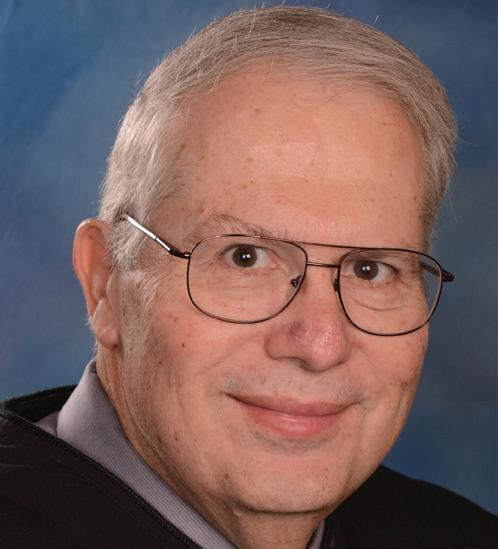
The Honorable Dennis J. Adkins Montgomery Cty Common Pleas Ct 41 N. Perry St. Dayton, OH 45422-1431 dennis.adkins@montcourt.oh.gov 937-496-7951
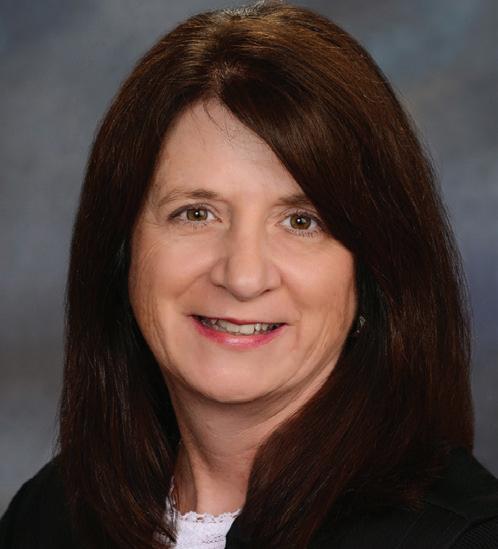
The Honorable Mary Katherine Huffman Montgomery Cty Common Pleas Ct 41 N. Perry St., 3rd Fl Dayton, OH 45422-2150 mary.huffman@montcourt.oh.gov 937-496-7955
Please detail your legal biography using the following format Undergraduate Education; Legal Education; Graduate Education and Legal/Courtroom Experience: Judge Adkins was appointed to the General Division bench on June 6, 2011. He received his B.S. from the University of Dayton in 1982, and his J.D. from the Salmon P. Chase College of Law at Northern
Kentucky University in 1986. From 1986 to 2011, Judge Adkins practiced law in the Dayton area, engaging in both criminal and civil litigation. Judge Adkins is a member of the American, Ohio, and
Dayton Bar Associations, the Ohio Common Pleas Judges Association, and has taught continuing legal education seminars. He currently serves on the Dayton Bar Association’s Certified Grievance Committee and the Judicial Advisory Board of the MonDay Community Correctional
Institution. In 2013, Judge Adkins created the first Veteran’s
Treatment Court in this area. He presides over the court, which is designed to provide treatment and rehabilitation for veterans involved in the Criminal Justice System due to combat related problems.
Please explain why you believe you are qualified for the judicial position for which you are seeking election. I have 35 years of experience in the legal justice system. I have practice civil litigation in private practice and well as criminal defense work along with prosecution duties for several municipalities.
I have personally tried hundreds of cases as a private attorney and have presided over numerous high level criminal and civil cases since becoming a Judge. Not only do I have the legal experience necessary,
I also bring a common sense approach to the bench in handling cases.
What experiences in your life or personal attributes make you believe that your courtroom would be a place where everyone receives justice, regardless of race, socio-economic status, gender, etc.? I have dealt with all levels of social-economic classes, genders, race, and diverse backgrounds my entire career. Everyone deserves the respect of the Court no matter what business brings them before the court. Like many others, my friends are not defined by their color of their skin, their gender classification, their religious beliefs, or the size of their bank account. I have found if you treat everyone equally, you will garner respect from all.
What will be the most significant challenge facing courts over the next ten years and what plans do you have to address that challenge? Covid-19 has already proven to be a great challenge and may continue to be a challenge into the future. Similar ailments may arise that will need to be addressed. The court has learned a lot from this pandemic, especially in the use of electronic capabilities, which will assist the court in being more efficient in the future. Jail overcrowding is a continuing challenge and new ways need to be developed to find alternative resources to lower the crime in our communities. The
Court is constantly looking into new ways to reduce crime and provide treatment alternatives and will continue to do so.
Please detail your legal biography using the following format Undergraduate Education; Legal Education; Graduate Education and Legal/Courtroom Experience: • Wright State University, B.A., Political Science, 1985, summa cum laude • University of Dayton School of Law, J.D., 1990, summa cum laude • University of Nevada, M.A. Judicial Studies, 2015, summa cum laude • National Judicial College, Certificate in General Jurisdiction Trial Skills and
Certificate in Dispute Resolution Skills • Judge, Montgomery County Common Pleas Court February, 2002-present • Partner, Huffman, Landis & Weaks, 1990-2012, general practice trial attorney • University of Dayton School of Law, Adjunct Professor, 2003-present
Please explain why you believe you are qualified for the judicial position for which you are seeking election. I have been a trial court judge for 18 1/2 years, presiding over a vast array of cases, both criminal and civil. My trial experience includes, but is not limited to death penalty trials and post-trial litigation, criminal trials on charges ranging from theft to aggravated murder, complex civil litigation, workers compensation, personal injury, business and employment matters, contractual disputes, real estate and appropriation matters, civil rights litigation, and a wide variety of other matters.
Additionally, my work experience includes hearing motions and researching and writing decisions on a vast array of topics including criminal suppression issues involving a claimed violation of Constitutional rights, post-conviction proceedings, summary judgment, motions to dismiss, declaratory judgment and other matters.
What experiences in your life or personal attributes make you believe that your courtroom would be a place where everyone receives justice, regardless of race, socio-economic status, gender, etc.? Due process and fundamental fairness are at the forefront of the responsibilities of a trial judge. Providing each litigant with the opportunity to be heard in a meaningful and complete manner, regardless of the person’s race, gender, ethnicity, socio-economic status or other personal circumstances, contributes to not only the litigant’s perception of the fairness of the proceedings, but also to the fundamental equity and fairness of the entire justice process. I firmly embrace and practice the mission statement of our court - together we provide fair and efficient justice under the law for all.
What will be the most significant challenge facing courts over the next ten years and what plans do you have to address that challenge? There are a number of challenges facing courts in the next ten years, and too many to discuss here. I will comment upon two challenges - first, the reduced resources available to courts to assist persons involved in the criminal justice system, through probation services, to aid in addressing life circumstances related to concerns related to life stability that can lead to a reduction in future criminal conduct, such as housing, health, family concerns, education, employment and other critical circumstances. I will continue to advocate for the funds and resources critical to the court’s important function of providing services. Additionally, courts are re-evaluating policies and practices on pre-trial detention, understanding that bail decisions must be based upon evidence related to the individual so that conditions of pre-trial release, including bond, relate solely to the individual’s risk of failure to appear in court or risk to the public from pre-trial release. I recently served as the
Chair of the Ohio Supreme Court Task Force to Examine the Ohio Bail System and
I have been a vigorous advocate for reform in pre-trial release that encourages rules that, while strongly considering public safety, depend upon the circumstances of the individual accused. I will continue to work for reform in practices that ensure that courts are guided by individual considerations to inform pre-trial release decisions.

The Honorable Richard S. Skelton Montgomery Cty Common Pleas Ct 41 N. Perry St., 3rd Fl Dayton, OH 45422-2150 Richard.Skelton@montcourt.oh.gov 937-225-4368
Please detail your legal biography using the following format Undergraduate Education; Legal Education; Graduate Education and Legal/Courtroom Experience: • Wright State University, B.A. • University of Dayton School of Law, J.D.
Please explain why you believe you are qualified for the judicial position for which you are seeking election. I was in private practice for over 25 years and practiced heavily in the
Montgomery County Common Pleas Court. I have extensive experience in Civil and Criminal litigation.
What experiences in your life or personal attributes make you believe that your courtroom would be a place where everyone receives justice, regardless of race, socio-economic status, gender, etc.? I do not see color when it comes to people. I worked my way through college and loaned/worked through law school. I understand hard work and treat everyone with respect.
What will be the most significant challenge facing courts over the next ten years and what plans do you have to address that challenge? Technology advances quickly and our Court has a reputation for being on the leading edge. The challenge is lead, not follow. In addition,
Courts must foster fairness to all litigants irrespective of race, profession or allegation. Our constitution guarantees protections for all and out pledge must be to maintain fundament fairness for everyone.
Choose from Over 50 CLE Programs Available to You Online - Wherever You See this Logo!
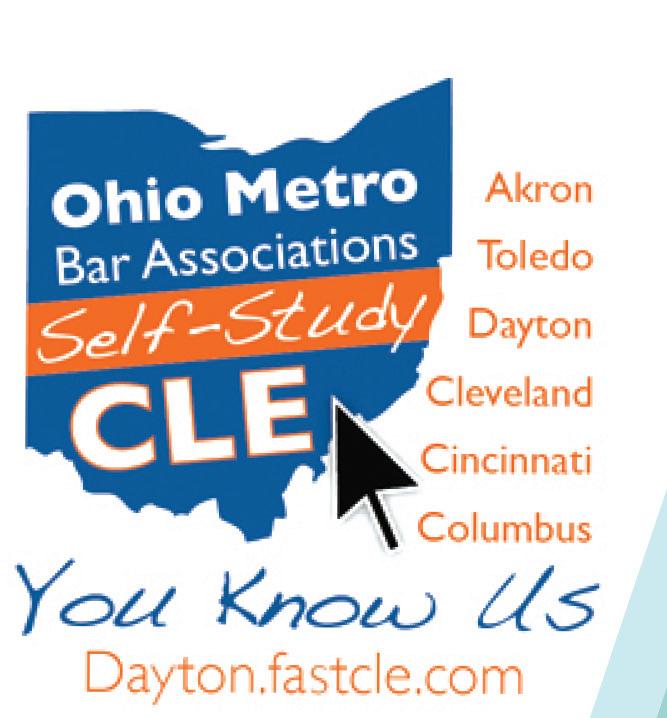
Visit daybar.ce21.com and go to the CLE tab to access self-study library Did you know?
Judges, Magistrates and Attorneys with last names M-Z can complete ALL CLE Credits ONLINE Due to COVID-19, the Supreme Court of Ohio has waived the cap on self-study courses, including webinars For more information, visit: supremecourt.ohio.gov/AttySvcs/CLE/
View list of handful of Self-Study CLE Below!
Taking Criminal Defense to the Next Level: Leveraging Cell Phone, Computer and Electronic Device Technology with Cell Phone Privacy Challenges 3.0 Prof Conduct Hrs
Privacy 2020: Meeting the Challenges of a New Decade 1.0 Gen Hr
Emerging Issues in Reproductive Technologies 1.0 Gen
May 4, 1970 Kent State University Shootings CLE 1.0 Gen Hr Cleveland Metro Bar Association's International Women's Day Summit 4.5 Gen Hrs
Senate Bill 201 "The Reagan Tokes Law" and Senate Bill 231 2.0 Gen Hrs
Active Shooter Response Plan & the Legal Issues 3.0 Gen Hrs
Ethical Obligations and Best Practices for Bankruptcy Practitioners 1.0 Prof Conduct Hr
